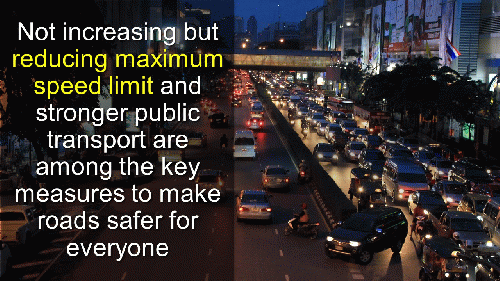Bobby
Ramakant - CNS

Reducing speed limit and strong public transport for everyone are important if we are to make roads safer for everyone
(Image by CNS) Details DMCA
Thailand was among the countries globally that promised last year to reduce the maximum speed limit to 30 kilometre per hour (30 kph) to reduce road-traffic crashes, and thus, save lives. More importantly, the government of Thailand played a major role last year as part of the International Advisory Committee to 3rd Global Ministerial Conference on Road Safety held in Stockholm during 19-20 February 2020.
But according to a news provider, the Thai government is set to increase the maximum speed limit on major highways (with four or more lanes) from 90 kph to 120 kph. In addition, the rightmost lane or 'fast lane' will also have a minimum speed limit of 100 kph to reduce the risk of rear-ending collisions.
During 19-20 February 2020, the Stockholm Declaration was adapted at the 3rd Global Ministerial Conference on Road Safety, by ministers and heads of government delegations, which has one of these commitments enshrined: "focus on speed management, including the strengthening of law enforcement to prevent speeding and mandate a maximum road travel speed of 30 km/hour in areas where vulnerable road users and vehicles mix in a frequent and planned manner, except where strong evidence exists that higher speeds are safe, noting that efforts to reduce speed in general will have a beneficial impact on air quality and climate change as well as being vital to reduce road traffic deaths and injuries."
will roads become safe or unsafe if we increase speed limit?
This news also states that "The new speed limit will assist with traffic flow while boosting convenience and safety for road users". But stronger evidence is piling on from cities that have reduced the maximum speed limit to 30 kph. Cities that have implemented maximum road travel speed of 30 kph have shown lifesaving decline in road-traffic crashes too. That is why, the commitment to reduce maximum travel speed limit to 30 kph was made by governments including that of Thailand.
Think about this: roads must become safer and convenient not just for motorised vehicle riders, but for everyone as each one of us has a human right to commute safely - such as those who walk, cycle, do vending on roadsides, or opt for non-motorised options. Moreover, it is not only those who ride motorised vehicles but also those who cycle, walk or use other forms of transport or engage in roadside vending or other activities, who get injured or die untimely in these crashes.
According to the 2020 review of the World Health Organization (WHO), "each day, for almost 60 people in Thailand, travel from their homes - is a journey of no return. Most of these are young people, people of working age - in the prime of their lives. Most use motorcycles, the most common vehicle on Thailand's roads. Most die in crashes with larger vehicles." This review further added "Motorcycle riders, cyclists, pedestrians and those who have physical limitations, such as people with disabilities, children and older persons are relatively unprotected and, therefore, more vulnerable to serious injury and death."
(Note: You can view every article as one long page if you sign up as an Advocate Member, or higher).





